Penis Envy, Pizza and Class Registration: What You Missed at Pizza With the Psychology Professors
You read that correctly: there was talk of penis envy (and its cringe-inducing origins) and registration for psychology courses in the Fall between mouthfuls of pizza; there were discussions on the historical views of PTSD and psychology textbooks through sips of soda; conversations about the myth of “intelligence types” and “learning styles” were followed by inquiries about what path a prospective or current psychology student should take, all the while the stacks of Little Caesar’s grew smaller and smaller.
All of this talk took place in a setting surrounded by classic components of psychological understanding, with Skinner boxes accompanied by their obligatory rats, adorable stuffed brain cells, cross-sections of an actual brain and psychology textbooks sitting on almost every table.
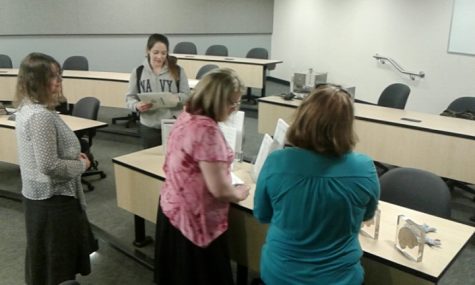
The Psychology Department hosted the event, featuring professors Cheyne Bamford, Erica Henningsen, Allison Hagood, and Department Chair Amy Wilkerson. The event was housed in room M3750, beginning at 4 p.m. and wrapping up around 6 p.m. Professors Terrie Bechdel (Criminal Justice) and Jamey Trotter (English/Journalism Department) also stopped by for a slice and some psycho chat.
But there was so much more going on during the event dubbed Pizza With the Psychology Professors than just pizza chewing and the deconstruction of antiquated Freudian terms: students were able to approach professors they knew (or didn’t know) and gain insight into what their journey into the world of psychology might entail; psychology professors were able to pass on expertise and advice about the field they dedicated themselves to; and all who came ended up learning something important, whether it were about what courses were available in the Summer and Fall semesters, or which student might be interested in studying criminal justice and psychology.
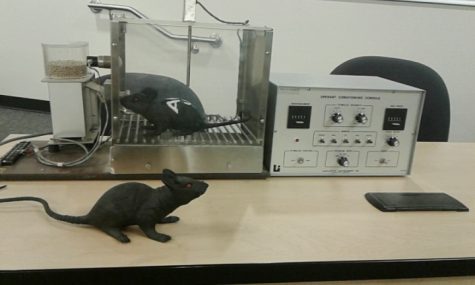
The intended goal of the event, according to Hagood, was to be an avenue of exploration for students who may be confused about psychology and other classes, to come and talk to psychology professors and get some targeted advice that could help figure out what a student is interested in.
“Having another avenue for students to get good guided information was the purpose of this — and also pizza,” she said.
The atmosphere was intellectual and light, with some students getting to know and understand their psychology professors a little better.
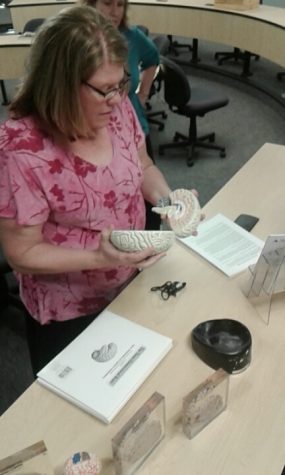
When one student asked professor Hagood, whose background includes clinical and research experience with adult mental disorders (with a specialization in schizophrenia), which of her backgrounds she enjoyed more, clinical practice or research, she gave this answer:
“Oh, that’s a tough one. There’s a ton of fun discovering a principle that helps a bunch of people in that setting, but there’s a true joy in witnessing somebody make a recovery that they previously believed they couldn’t make.”
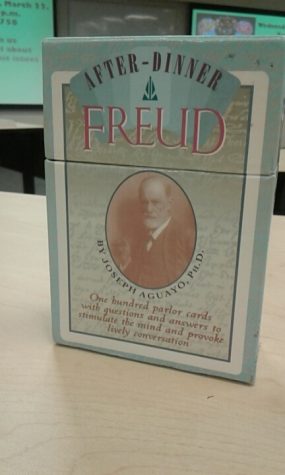
When another student inquired about their options for studying sexuality and gender, Professor Henningsen guided them with this anecdote: “If I could do it all over again, with no restrictions, I would go to Indiana — to the Kinsey Institute. I would probably get my Ph.D. in Sexuality and Gender.”
Henningsen also mentioned during the conversation that in her past, a dog of hers was named Maslow (after Abraham Maslow), because the dog “met [her] safety and security needs.”
It’s moments like these that really illustrate why providing spaces and opportunities for professors and students to interact in a non-classroom environment is important. While almost every student walked away from the event with knowledge in hand about their prospective future, they also walked away with a deeper understanding of who the people responsible for their education are.

But is there the possibility for more events like this with the Psychology Department here at ACC in the future?
“We’re gonna see the effectiveness of this [event] before we move forward, but who knows. We will look at how successful this is before we try this again next semester. We may do something else if that seems to be more effective,” said Hagood.
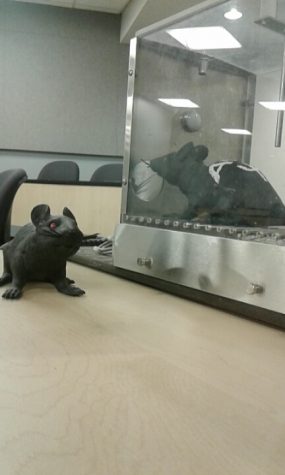
And while attendance was a bit lower than one might expect, what with the incumbent beckoning call of free food and college students’ propensity towards anything with ‘free’ or ‘food’ in the title, we may see more departments following suit in the future; but we also might not.
Perhaps Pi with Math Professors or Salad with a Sociology Professor? Maybe Cookies with Criminal Justice or Nachos with Nursing. Only the future will tell.
Are you considering a major in psychology? Wondering about changing majors? Registration for Summer courses has already opened, with plenty of seats still available in almost every class being offered, including several Psychology 101 courses. Fall registration opens March 30th. For more information regarding course registration, click here. For more information regarding Psychology degree programs and courses available at ACC, click here, here or here.




Norm Rosenblood • Mar 12, 2019 at 10:48 am
After all the spleen and outrage is there a better way to access the unconscious–in dreams and pathology– other than Freud’s model of dream analysis?
A tested Freudian might help you to interpret your own dreams. Now that would be interesting for all of us
Norm Rosenblood • Mar 25, 2017 at 10:50 am
Antiquated Freudian terms (sic)!
IT MIGHT BE USEFUL TO INCLUDE IN YOUR GROUP A TESTED Freudian ANALYST!
LOTS TO LEARN AND UNLEARN.
Scott Bright • Mar 27, 2017 at 7:32 am
Perhaps, except there would be an inherent bias towards Freud by a “tested Freudian analyst”. It is true that there is “lots to learn and unlearn”. One such thing to unlearn would be that Freud’s contributions to psychology as a field have been largely helpful. Quite the contrary is true; most of Freud’s research was fraught with confirmation bias, unreliable samples and a determinant discrepancy against women that were under his “care”.
It may be true that he contributed the method of psychoanalysis, but aside from that, he gave very little positive or even relevant contributions.
For instance, penis envy, babies exhibiting sexual interest and the Oedipus complex have all demonstrably been proven false and undeniably sexist or damaging to those involved. Penis envy originated from Freud’s (false) observation that women found themselves to be inferior to men once they realized they lacked the one thing that made men “better”: a penis. This is degenerative and untrue. Women do not experience penis envy, nor do they feel that they are lacking anything when it comes to their genitals (save for trans individuals, but that’s its own essay).
Then there’s babies exhibiting sexual interests, which besides being pedophilic in nature, is wrong. Babies may express curiosity towards their own body parts, but there is no sexual interest on their end. Freud literally believed that babies went through different developmental phases (which is true), each of which focused on an erogenous zone (which is the falsehood). Ever heard the phrase “anal retentive”? That originated from Freud’s proposed “Anal stage”, which posits that children experience pleasure and fixations based on sensations involving the anus. This is inherently incorrect, as this has been unproven when held up to scrutiny. It is more than likely Freud was projecting his own strange sensibilities and beliefs and interests onto the children he was studying. Nobody is able to reproduce his results using his methods or terms, which is the definition of unscientific.
Finally, there’s the Oedipus complex, which we all know essentially posits that men come to have an erotic interest in their mother which fuels a lateral hatred for the father. Aside from being incestuous, long story short, research has not been able to prove this theory correct, nor has anybody been able to reproduce his “findings” that substantiate any of his proposed ideas.
Freud as a whole is damaging to the psychological community and the fact that we still have to talk about him is part of the problem. Freud apologists will always come out of the wood-works to say that Freud didn’t mean what he said, even though letters penned by Freud admit that he meant exactly what he said (he then ordered all of his work and letters be burnt after his death, which thank god his assistants didn’t).
So ultimately, we don’t need to include Freudian analysts as they more than likely amount to Freud apologists.
Tl;dr Freud is a fraud and damaging no we don’t need a “tested Freudian analyst” because all we would have is a foolhardy and hardheaded Freud apologist who would only take away from our psychology programs, not add to them.